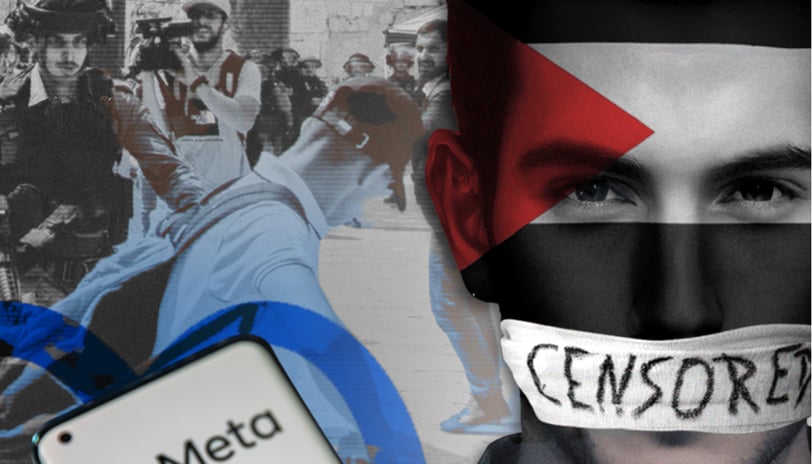Lawsuit Against Meta: Discrimination Against Muslims and Suppression of Solidarity With Palestine
A major civil rights lawsuit accuses Meta of religious discrimination against a Muslim employee who expressed solidarity with Palestinians. Learn how this case could reshape workplace rights in Big Tech.
GLOBAL
Refaat Ibrahim
6/26/20253 min read


In a legal escalation reflecting growing tensions inside major tech companies over free speech and political expression, the Council on American-Islamic Relations (CAIR), the largest Muslim civil rights organization in the United States, has filed a lawsuit against Meta, owner of Facebook, Instagram, and WhatsApp, accusing the company of religious discrimination. The case centers around the firing of Muslim employee Mohammed Firas Majid after he expressed solidarity with the Palestinian people and condemned the ongoing genocide in Gaza.
Religious Discrimination at Meta: The Lawsuit and Its Context
According to the legal filing submitted to a U.S. court, Meta discriminated against Majid on the basis of his Islamic faith, forcing him to choose between remaining true to his religious convictions or keeping his job at the company.
The lawsuit claims that Meta was neither fair nor transparent in its policies regarding employee speech on humanitarian and political issues. While non-Muslim employees were permitted to express their views freely on topics such as the war in Ukraine or the Black Lives Matter movement and even show support for Israeli victims after October 7, 2023, Majid faced disciplinary measures when he spoke out about Palestine or prayed for Muslim victims of Israeli airstrikes. These measures included formal reprimands, the removal of his content, repeated verbal warnings, and ultimately, termination.
The legal complaint goes beyond seeking a reversal of Majid’s dismissal. It demands structural reform within Meta, including a court order barring future discrimination, expunging all negative references from Majid’s employment record, implementing annual religious sensitivity training for Meta’s leadership, and awarding punitive financial damages.
Who Is Mohammed Firas Majid?
Mohammed Firas Majid, originally from India, joined Meta in 2018 and maintained a strong professional record. As a practicing Muslim, he felt a moral and religious obligation to speak out about the suffering in Gaza. Inside the company’s internal communication platforms, he witnessed discussions and expressions of solidarity around other global crises, particularly the war in Ukraine and racial justice campaigns in the U.S., without repercussions.
However, the response was drastically different when Majid spoke up about Palestine. He was reprimanded for posts that included prayers for Gaza’s victims and messages of compassion for the suffering Muslim population. These were labeled as policy violations, even though they posed no threat, promoted no hate, and reflected his personal ethical convictions. The reaction, he claims, was disproportionate and rooted in bias.
What makes Majid’s case particularly striking is that he was not posting inflammatory content but rather sharing deeply personal and faith-based messages of grief and solidarity. Still, Meta penalized him in ways not experienced by his peers. The lawsuit argues that this is evidence of systemic bias against Muslim employees and selective enforcement of company rules.
Broader Implications in Silicon Valley
This lawsuit sheds light on a deeper issue facing Muslims and other Palestine advocates within American workplaces, especially at large technology firms that publicly tout their commitment to diversity and inclusion.
Observers have long noted that while Silicon Valley companies speak loudly about social justice, they often fall short when it comes to Muslims or the Israeli-Palestinian conflict. Muslim employees, in particular, are increasingly afraid to express their views, especially since Israel’s intensified assault on Gaza beginning in October 2023.
The Meta case also follows growing criticism of the company’s content moderation practices. Human rights organizations have repeatedly documented how pro-Palestinian posts are removed or suppressed on Meta platforms. Posts that include words like “Gaza,” “occupation,” or “martyr” are frequently flagged or deleted, prompting allegations of censorship and double standards.
Seen in this light, what happened to Mohammed Firas Majid is not an isolated case but part of a larger institutional pattern. His firing underscores how pro-Palestinian expression, even when peaceful and rooted in religious identity, can be treated as a liability in corporate environments, particularly in companies with global political entanglements.
Could This Case Lead to Policy Changes?
The outcome of this lawsuit may have lasting effects, whether through a court ruling or increased public scrutiny. If Majid succeeds in proving his case, it could pave the way for other employees to speak out or file similar claims, compelling companies to reassess how they manage religious and political expression.
The case could also mobilize civil society groups to demand more accountability from Big Tech, especially amid concerns that these companies are shaping narratives through algorithmic censorship or biased internal policies.
Ultimately, Majid is not just seeking personal justice; he is demanding institutional change. As CAIR emphasized, this lawsuit is a call to defend the rights of Muslim Americans who feel silenced in their workplaces, marginalized for their beliefs, and punished for their empathy.
Conclusion
The lawsuit brought by Mohammed Firas Majid against Meta is a powerful indictment of institutional discrimination in the heart of the tech industry. It is more than an employment dispute; it’s a battle over the right to express compassion, the right to religious freedom, and the right to dignity in the workplace. In a world increasingly defined by digital power and corporate influence, companies like Meta must be held accountable not just for their technology but for their values and how they treat the people behind the screens.
Awareness
Documenting reality, amplifying Palestinian voices, raising awareness.
Contact Us:
resistant.p.pens@gmail.com
Follow our social media
